
🌾 Introduction to JEEVN AI: A Game-Changer for Arkansas Rice Farmers
In the heartland of American rice production, Arkansas farmers are constantly seeking ways to improve their yields and efficiency. Enter JEEVN AI, an innovative solution by Farmonaut Technologies that’s set to transform the rice farming landscape in the Natural State. This cutting-edge tool harnesses the power of artificial intelligence and satellite technology to provide Arkansas rice farmers with precise, actionable insights tailored to their specific needs.
Arkansas, producing nearly 50% of U.S. rice, faces unique challenges in maintaining its agricultural dominance. JEEVN AI steps in to address these challenges head-on, offering a suite of features designed to optimize every aspect of rice cultivation in the region.
🛰️ How JEEVN AI Works: Bringing Space-Age Tech to Arkansas Fields
JEEVN AI’s sophisticated system integrates multiple data sources to deliver personalized recommendations for Arkansas rice farms. Here’s how it works:
- Utilizes satellite intelligence from Farmonaut
- Incorporates local Arkansas weather data
- Analyzes farm-specific information
- Processes various agricultural parameters
By combining these data points, JEEVN AI creates a comprehensive picture of each farm’s unique conditions, allowing for tailored advice that considers the specific challenges of Arkansas rice cultivation.
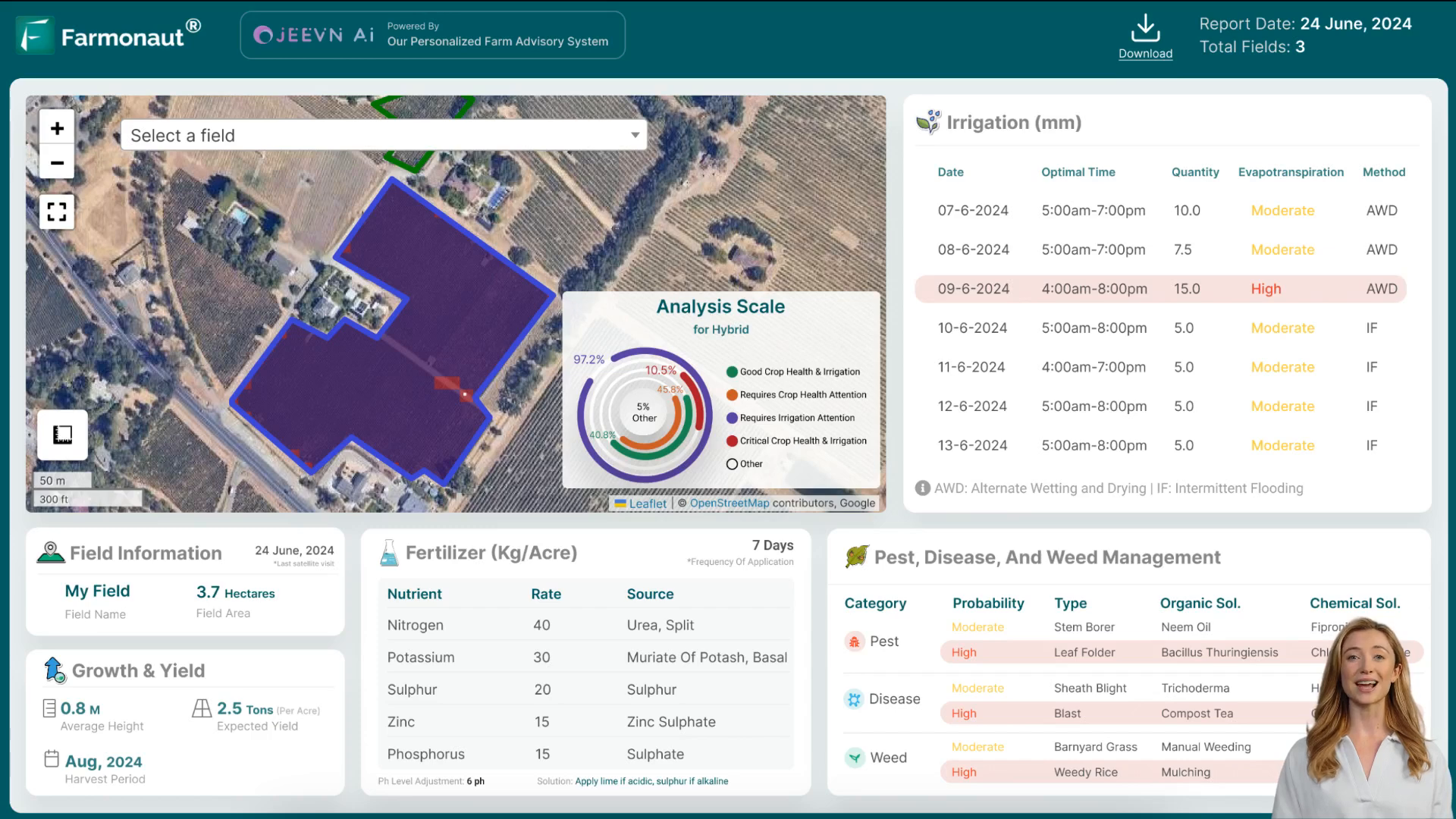
🌱 Soil Nutrient Analysis: Optimizing Arkansas Rice Fields
Arkansas rice farmers know that soil health is paramount to successful yields. JEEVN AI provides detailed insights into soil nutrient levels, focusing on key elements crucial for rice production:
- Nitrogen
- Phosphorus
- Potassium
- Zinc
- Sulfur
By analyzing these nutrient concentrations, JEEVN AI helps Arkansas farmers understand what their soil lacks and recommends appropriate fertilization strategies. This is particularly valuable in the diverse soil types found across Arkansas’s rice-growing regions, from the clay soils of the Grand Prairie to the silt loams of the Mississippi Delta.
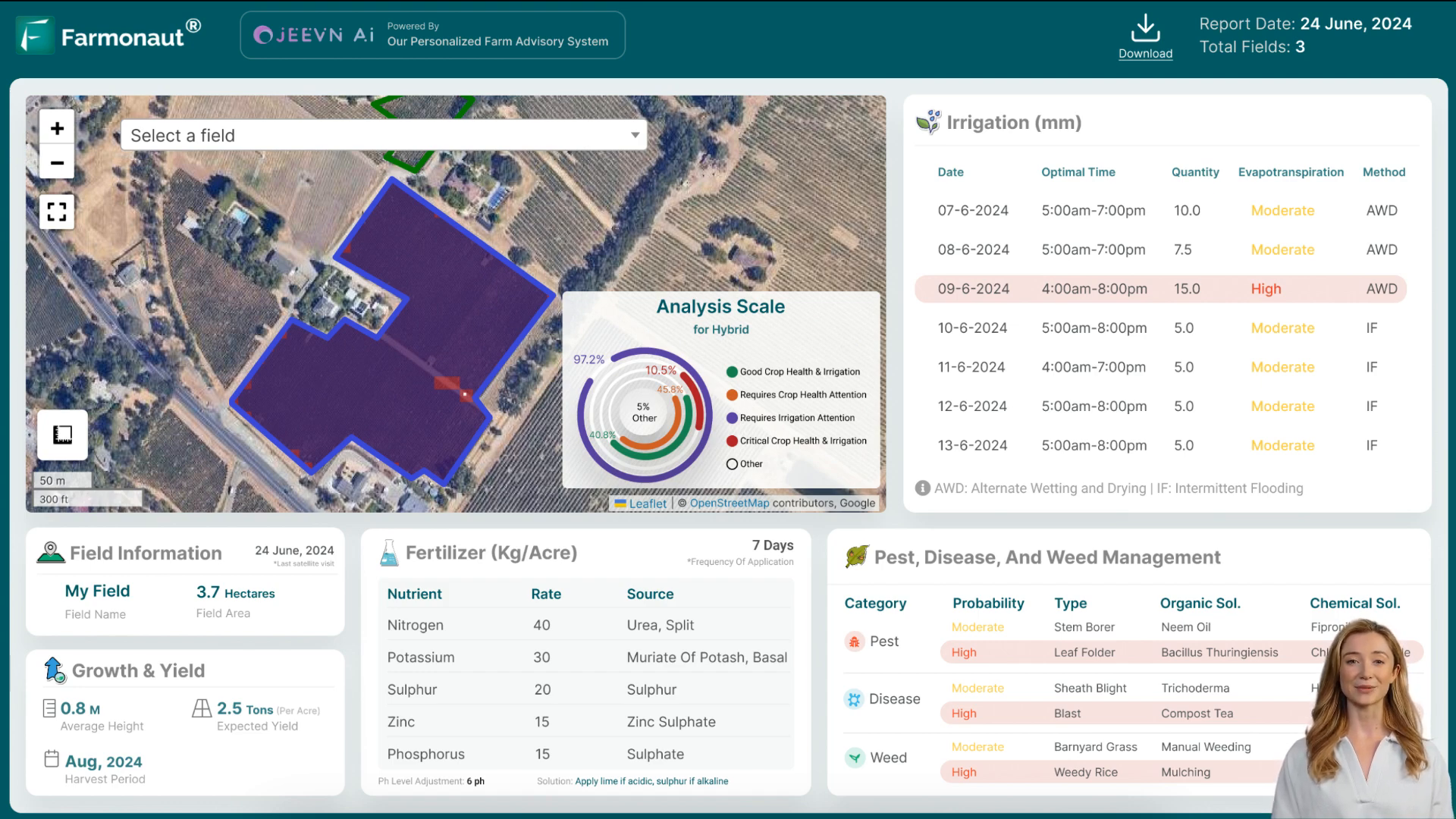
🧪 Maintaining Optimal Soil pH: A Key to Arkansas Rice Success
Soil pH plays a crucial role in nutrient availability and overall soil health, especially in Arkansas’s rice paddies. JEEVN AI continuously monitors soil pH levels and offers corrective measures when needed. This feature is particularly beneficial for Arkansas rice farmers dealing with the state’s naturally acidic soils.
If the soil pH falls outside the optimal range for rice (typically 6.0 to 6.5 for Arkansas conditions), JEEVN AI suggests appropriate interventions:
- Lime application to raise pH
- Sulfur application to lower pH
By maintaining the ideal pH range, Arkansas rice farmers can enhance nutrient uptake, leading to better crop performance and higher yields.
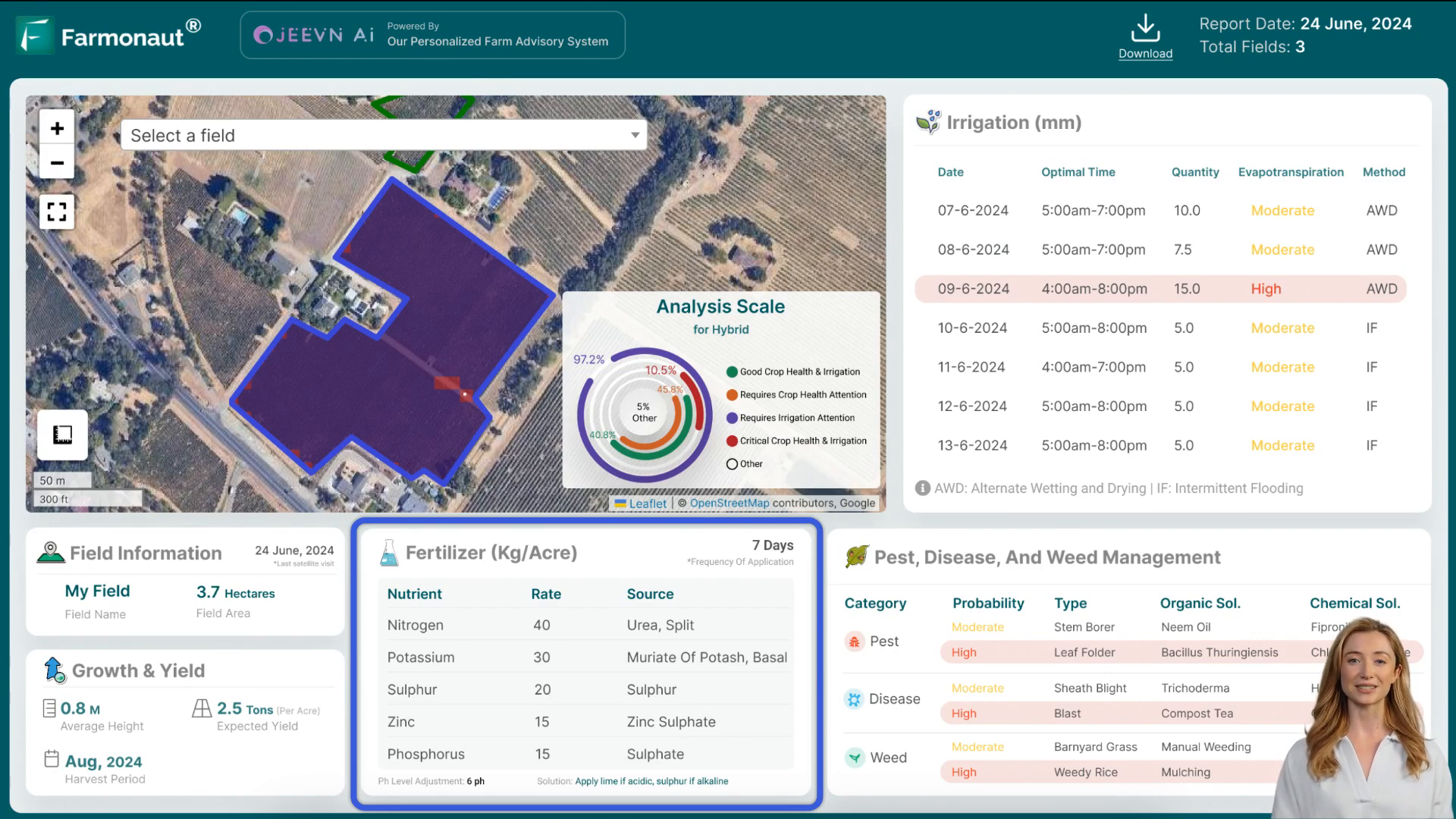
🐛 Early Pest and Disease Detection: Protecting Arkansas Rice Crops
One of JEEVN AI’s most impressive features is its ability to identify potential pests and diseases affecting rice crops. This is particularly valuable in Arkansas, where rice water weevils, rice stink bugs, and diseases like sheath blight can cause significant damage.
JEEVN AI analyzes various data sources to predict pest outbreaks and suggest preventive measures:
- Satellite imagery analysis
- Weather pattern interpretation
- Local data integration
For example, if conditions become favorable for rice blast, a common fungal disease in Arkansas, JEEVN AI will alert farmers and provide preventive measures to protect their crops. This early detection system allows for targeted interventions, reducing the need for broad-spectrum chemical pesticides and promoting more environmentally friendly farming practices.
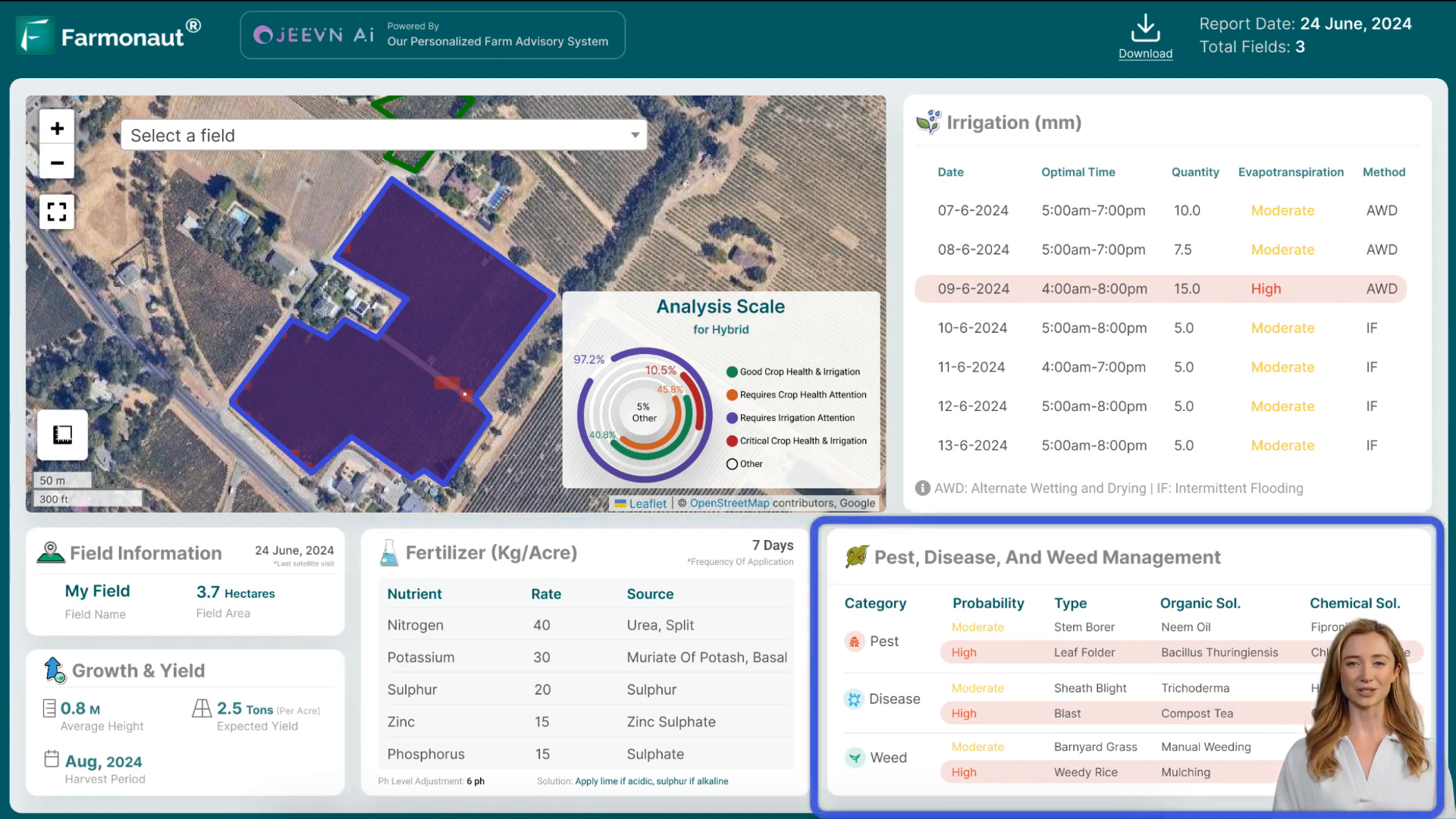
💧 Efficient Water Management: Crucial for Arkansas Rice Production
Water management is a critical aspect of rice farming in Arkansas, where the crop is traditionally grown in flooded fields. JEEVN AI helps optimize irrigation schedules by considering:
- Local weather data
- Soil moisture levels
- Specific rice variety requirements
By providing precise recommendations on when and how much to water, JEEVN AI helps Arkansas rice farmers conserve water resources and prevent over or under-irrigation. This is particularly important in regions like the Arkansas Grand Prairie, where groundwater depletion is a growing concern.
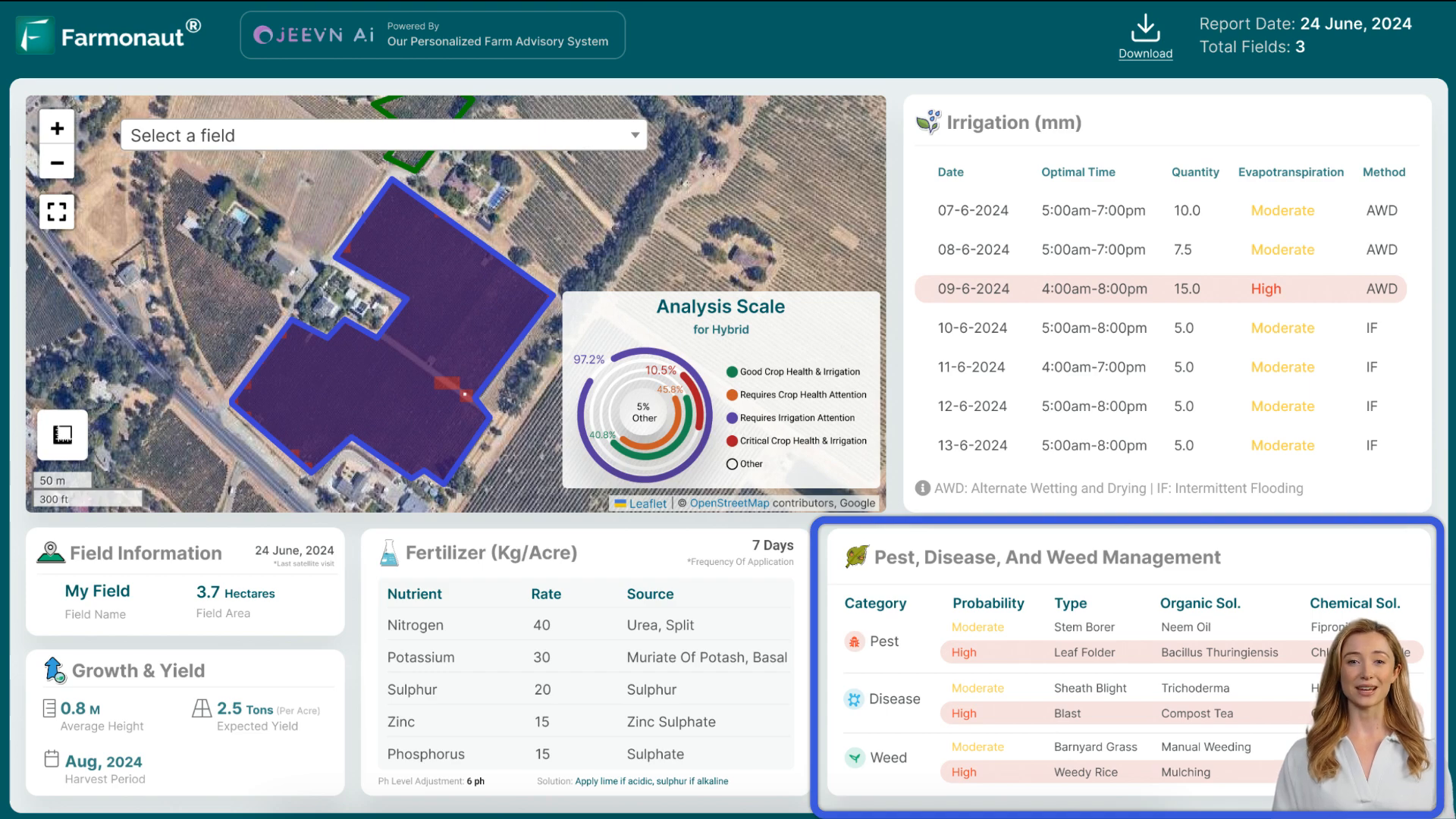
📈 Maximizing Crop Growth and Yield: Boosting Arkansas Rice Production
JEEVN AI’s impact on crop growth and yield is profound, offering Arkansas rice farmers a comprehensive tool to enhance their productivity. The system provides critical predictions on:
- Crop height
- Expected yield per acre
- Anticipated time until harvest
These predictions allow Arkansas farmers to make informed decisions and plan their activities more efficiently. For instance, farmers in the Mississippi Delta region can better prepare for harvest time, coordinating with local mills and transportation services.
Regular monitoring and timely interventions facilitated by JEEVN AI can result in healthier rice crops with fewer instances of stress and disease. This leads to higher quality produce and increased market value, a significant benefit for Arkansas’s rice industry, which contributes over $6 billion annually to the state’s economy.
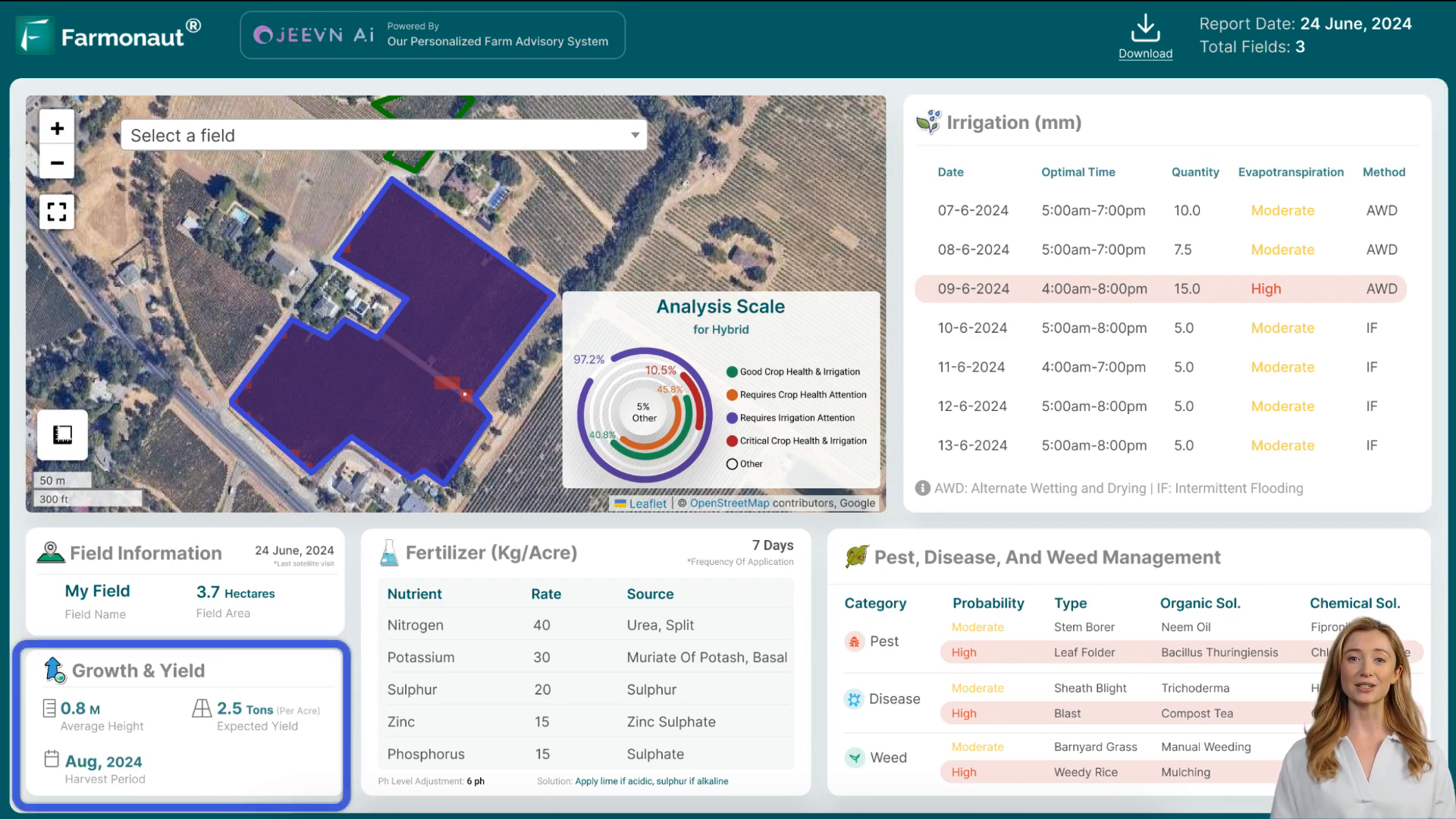
🚀 The Future of Arkansas Rice Farming with JEEVN AI
JEEVN AI represents more than just a farm advisory tool; it’s a game-changer for Arkansas’s rice industry. By leveraging the power of artificial intelligence and satellite technology, JEEVN AI provides farmers with the insights and recommendations they need to optimize their farming practices and achieve greater success.
For Arkansas rice farmers facing challenges such as water scarcity, pest pressures, and market fluctuations, JEEVN AI offers a path to more sustainable and profitable farming. It’s a tool that aligns perfectly with Arkansas’s reputation for innovation in rice production, home to the first rice breeding program in the U.S. and a leader in sustainable rice farming practices.

❓ Frequently Asked Questions about JEEVN AI for Arkansas Rice Farmers
Q: How does JEEVN AI account for Arkansas’s specific rice varieties?
JEEVN AI is designed to adapt to local conditions and crop varieties. It considers the specific characteristics of popular Arkansas rice varieties like Diamond, LaKast, and Roy J when providing recommendations.
Q: Can JEEVN AI help with Arkansas’s sustainable rice farming initiatives?
Absolutely. JEEVN AI’s water management and pest control features align well with sustainable farming practices, supporting initiatives like the Arkansas Discovery Farm program.
Q: How does JEEVN AI integrate with existing farm management systems used in Arkansas?
JEEVN AI is designed to complement existing farm management systems. It can integrate data from various sources, enhancing the overall farm management strategy.
Q: Is JEEVN AI suitable for both small family farms and large commercial operations in Arkansas?
Yes, JEEVN AI is scalable and can provide valuable insights for farms of all sizes, from small family operations to large commercial farms across Arkansas’s rice-growing regions.
Q: How does JEEVN AI account for Arkansas’s unique climate challenges, such as hurricanes or extreme heat?
JEEVN AI incorporates local weather data and can provide alerts and recommendations to help farmers prepare for and mitigate the impacts of extreme weather events common in Arkansas.
As Arkansas continues to lead the way in U.S. rice production, tools like JEEVN AI will play a crucial role in maintaining this competitive edge. By embracing this technology, Arkansas rice farmers can look forward to more efficient, productive, and sustainable farming practices, ensuring the state’s agricultural legacy for generations to come.















